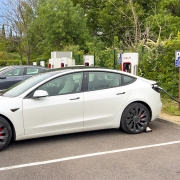This Rush to Electric Cars is a Colossal Mistake
We may soon regret the radical and absolutist embrace of electric vehicles (EVs). Governments across the world are planning to ban sales of new petrol and diesel cars, and to take older, gas-guzzling vehicles off the road. The Biden administration is proposing strict new pollution limits, as well as vast state subsidies, to accelerate the US’s transition to EVs.
Replacing the massive $3 trillion global car industry is an extremely high-risk economic gamble, particularly for the West. It could also threaten the mobility of all but the richest among us. And all this is being risked for environmental benefits that may prove far less robust than is often claimed. This is not to say that EVs won’t help us to reduce CO2 emissions or to clean the air. The problem is that, at least in the immediate future, they should not be the only option available to consumers.
Toyota, for instance, has argued that there are other, more affordable and quicker ways to reduce emissions than transitioning exclusively to EVs. While Toyota is investing in electric batteries, it also hopes to continue offering hybrid and hydrogen-powered cars in the coming decades. For stating this openly, it has come under fire from green lobbyists and politicians. New York City’s comptroller, Brad Lander, has even decided to restrict the city’s pension fund’s investments in the Japanese car company, due to its unwillingness to faithfully follow the green party line.
The zealots and economic interests pushing an all-electric future generally ignore the challenges inherent in their plans. For one thing, despite promises of lower costs for EVs, the now enormous demand for key components, like lithium, copper and aluminum, means that prices are unlikely to fall any time soon. Battery prices alone will keep the price of EVs high, as the cost of components has risen threefold since 2021.
To be sure, EV mandates have made Tesla-owner Elon Musk a very rich man. But the transition to electric cars will be no boon to the middle and working classes. The average price for a brand-new EV is over $60,000 – about $12,000 more than the average four-door sedan. Even with tax credits, it is hard to see how consumers come out ahead, at least for now. Certainly, working- and middle-class Americans won’t be snatching up the newly planned $300,000 Cadillac EV. Even the popular Model Y Tesla SUV is out of reach for many, as its price has fluctuated between $54,000 and $70,000 over the past year. Perhaps more importantly, the electric version of the Ford F-150 pickup truck costs an additional $26,000 compared with the popular gasoline-powered variety.
In simple terms, the push for EVs represents an assault on the working class. Two-thirds of all EV owners have incomes in excess of $100,000. According to United Latinos Vote, a California-based advocacy group, green attempts to ‘phase out’ affordable cars in favour of ‘expensive EVs’ might make it possible for ‘our rich neighbours in the next town to charge their Teslas’, but they would ‘make it unaffordable to use our [cars]’.
EV mandates are also likely to force up the price of now restricted traditional cars. In the meantime, greens will demand higher fuel prices to reduce drivers’ consumption of the demon petrol. Ultimately, as even the Washington Post recently admitted, electric vehicles are hastening a return to conditions not seen since the early 20th century, when the automobile was a luxury item. ‘New cars, once part of the American Dream, [are] now out of reach for many’, it notes. Not everyone will object to this, of course. Making cars more expensive will also advance the long-standing green goal of radically reducing car use.
Read the rest of this piece at Spiked.
Joel Kotkin is the author of The Coming of Neo-Feudalism: A Warning to the Global Middle Class. He is the Roger Hobbs Presidential Fellow in Urban Futures at Chapman University and Executive Director for Urban Reform Institute. Learn more at joelkotkin.com and follow him on Twitter @joelkotkin.
Photo: Petr Kratochvil, under CC 0 Public Domain License.









